How to Conduct a Pre-Employment Driving Record Check
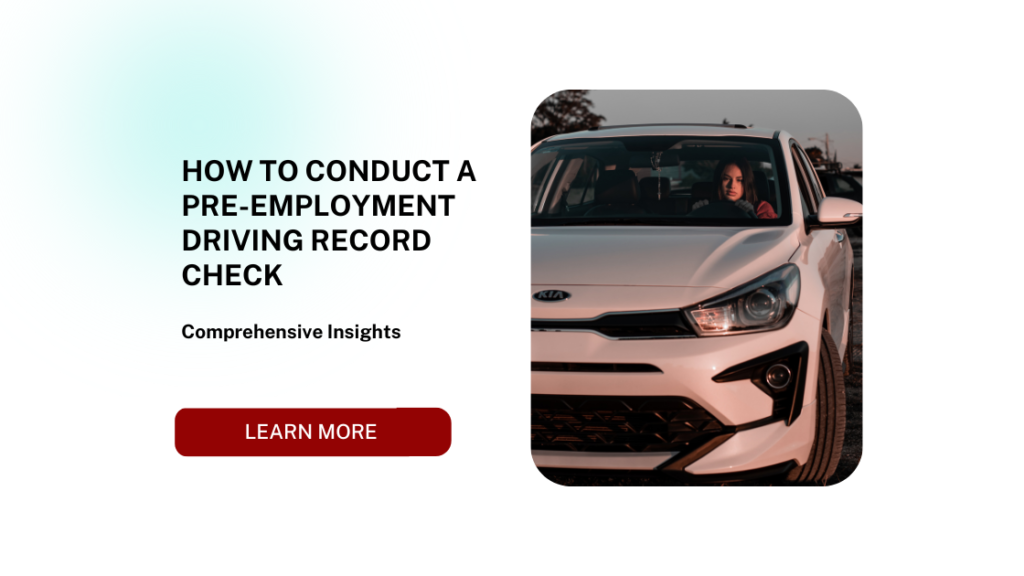
Understanding Pre-Employment Driving Record Checks
A Pre-Employment Driving Record Check is a specialized background screening process that evaluates an individual’s driving history to ensure they meet the safety and reliability standards required for job roles involving driving. For employers, this check is a critical tool to assess the suitability of candidates for roles that involve operating company vehicles, delivering goods, transporting passengers, or otherwise being responsible for road safety.
Driving record checks have become a standard part of pre-employment screening, particularly for industries where driving is integral to the role. This comprehensive evaluation goes beyond the surface, revealing traffic violations, license suspensions, accidents, and other key factors that can affect a candidate’s eligibility.
Why Pre-Employment Driving Record Checks Are Crucial
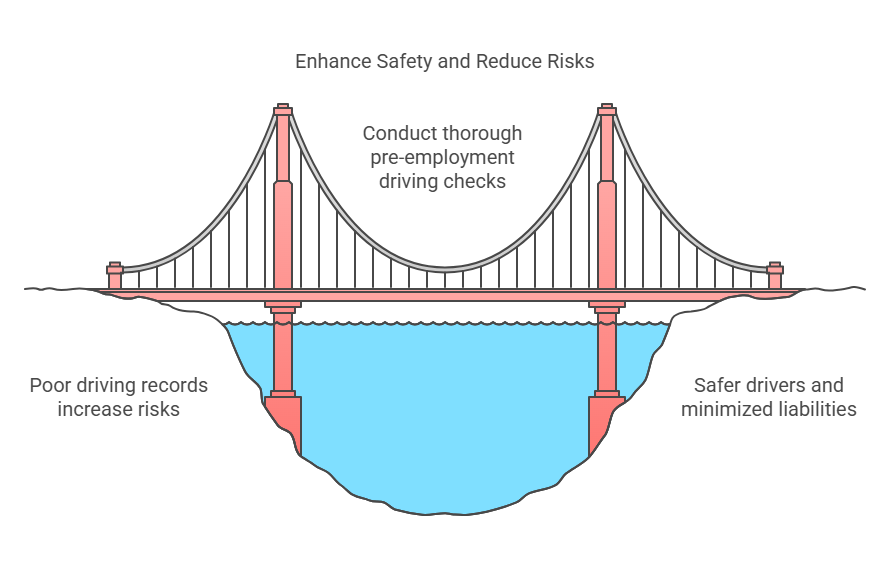
Employers rely on driving record checks to:
- Ensure Public Safety
- A history of reckless driving, DUI offenses, or frequent accidents may indicate that a candidate poses a risk to public safety. By screening driving records, employers can make informed decisions to prevent accidents and injuries caused by negligent driving.
- Minimize Liability Risks
- Hiring a driver with a poor record can result in costly lawsuits, higher insurance premiums, and reputational damage if an incident occurs. By conducting thorough checks, employers can mitigate these risks and protect their bottom line.
- Protect Company Assets
- For businesses that depend on company-owned vehicles, it’s vital to entrust them to responsible drivers. Poor driving habits can lead to excessive wear-and-tear or costly damage to fleet vehicles.
- Comply with Industry Regulations
- Many industries, such as transportation and logistics, have strict regulatory requirements for driver qualifications. Conducting driving record checks helps employers meet these standards and avoid penalties for non-compliance.
What Information is Included in a Driving Record?
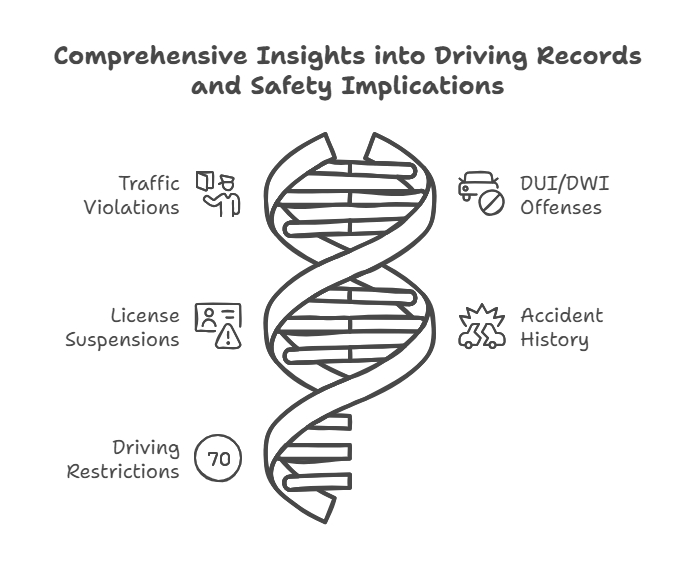
A driving record is a comprehensive document that provides detailed insights into an individual’s driving behavior. Employers can expect the following information to be included:
1. Traffic Violations
- This includes moving violations such as speeding tickets, running stop signs, or failing to yield. These offenses reflect the driver’s adherence to traffic laws.
2. DUI or DWI Offenses
- Records of driving under the influence (DUI) or driving while intoxicated (DWI) are particularly serious, as they highlight impaired judgment and potential endangerment of others.
3. License Suspensions or Revocations
- Details about any periods when the individual’s license was suspended or revoked due to legal or safety violations.
4. Accident History
- Employers can review the frequency and severity of accidents involving the candidate, which may indicate a pattern of unsafe driving practices.
5. Points on the License
- Some states use a point system to track violations, where accumulating too many points within a certain period can result in license suspension.
6. Driving Restrictions
- Any specific restrictions or conditions tied to the individual’s license, such as medical limitations or a requirement for corrective lenses.
How Employers Use Driving Records in the Hiring Process
Employers incorporate driving record checks as part of a broader background screening process to assess a candidate’s overall suitability for a role. Here’s how driving records are used:
- Evaluating Candidate Risk
- Employers review the record for patterns of risky behavior, such as repeated speeding violations or DUIs, that could jeopardize the safety of others or increase liability for the company.
- Ensuring Regulatory Compliance
- Industries like transportation and logistics are subject to federal and state regulations. Driving record checks ensure that candidates meet these legal standards.
- Decision-Making in the Hiring Process
- Employers may weigh minor infractions differently than major offenses, taking into account the relevance of the driving record to the job role. For instance, a single speeding ticket might not disqualify a candidate, but a recent DUI might.
- Building Trust and Accountability
- By hiring drivers with clean records, employers can demonstrate their commitment to safety and reliability, fostering trust among clients, employees, and stakeholders.
Common Industries That Require Driving Record Checks
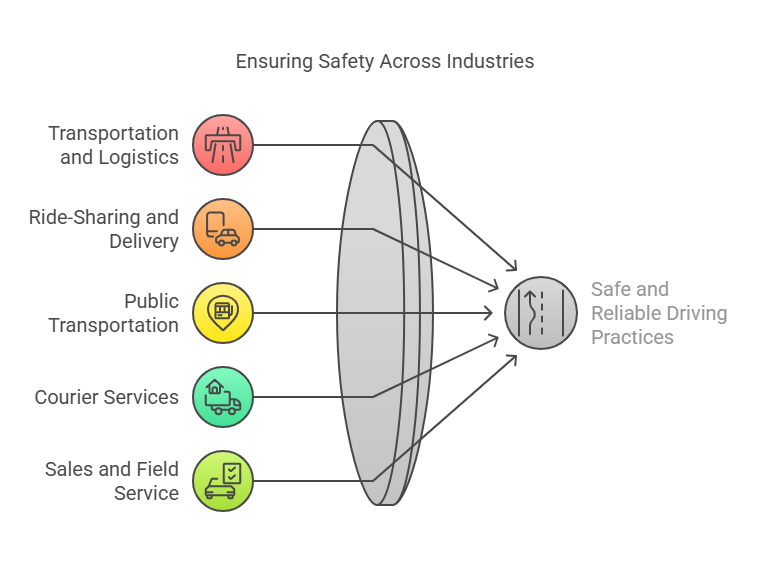
Driving record checks are especially critical in industries where driving is a core responsibility. Here are some examples:
1. Transportation and Logistics
- Truck drivers, delivery drivers, and other logistics professionals must have clean driving records to ensure the timely and safe transport of goods.
2. Ride-Sharing and Delivery Services
- Companies like Uber, Lyft, DoorDash, and Instacart require drivers to pass stringent driving record checks to maintain high safety standards.
3. Public Transportation
- Bus drivers, taxi drivers, and shuttle operators are entrusted with passenger safety, making it essential to hire individuals with spotless driving histories.
4. Courier Services
- Companies specializing in package delivery or postal services often require drivers to demonstrate a history of safe and responsible driving.
5. Sales and Field Service Roles
- Professionals in sales or field service roles who travel frequently for work must have clean driving records to protect company vehicles and maintain professional reliability.
Challenges in Driving Record Checks
Despite their importance, pre-employment driving record checks can present challenges for employers:
- Variations in State Laws
- Different states have different policies on what information is included in driving records and how long offenses remain on file. Employers must navigate these variations to ensure compliance.
- Outdated or Inaccurate Information
- Errors in driving records, such as unresolved tickets or outdated violations, can lead to unfair hiring decisions. Employers should work with trusted screening providers to ensure accuracy.
- Obtaining Candidate Consent
- Failing to obtain proper consent before conducting a driving record check can result in legal consequences. Employers must follow the Fair Credit Reporting Act (FCRA) guidelines to remain compliant.
How to Conduct a Pre-Employment Driving Record Check
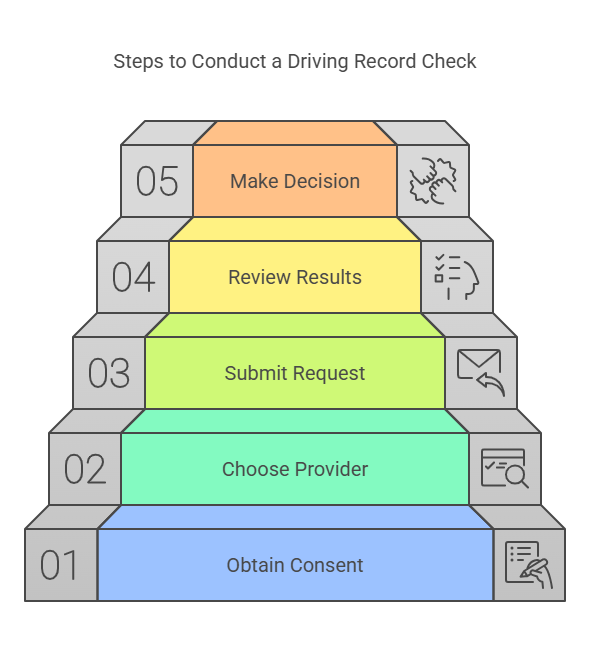
Conducting a Pre-Employment Driving Record Check is a straightforward but vital process that ensures employers make informed hiring decisions, particularly for roles involving driving responsibilities. Below is a step-by-step guide for conducting these checks:
1. Obtain Candidate Consent
Before accessing a candidate’s driving record, employers are legally required to secure written consent. This step is mandated under the Fair Credit Reporting Act (FCRA) and ensures that the candidate is aware of and agrees to the background screening process.
- Tips for Compliance:
- Provide the candidate with a clear disclosure form stating the purpose of the check.
- Ensure the disclosure is a standalone document and not buried within other paperwork.
- Retain a copy of the signed consent form for recordkeeping purposes.
2. Choose a Reliable Background Check Provider
Selecting a trustworthy provider is crucial for obtaining accurate and comprehensive driving record information. Many employers turn to third-party services, such as Exact Background Checks, which specialize in pre-employment screenings.
- Key Factors to Consider When Choosing a Provider:
- Compliance with FCRA regulations
- Ability to access state and national driving records
- Fast turnaround times for results
- Transparent pricing and services
3. Submit the Request to Access Driving Records
Once consent is obtained and a provider is selected, the next step is to submit a request for the candidate’s driving record. This can be done through:
- State Departments of Motor Vehicles (DMVs):
- Employers can request records directly from the DMV in the state where the candidate holds a driver’s license.
- Processing times and fees vary by state.
- Third-Party Background Screening Services:
- These services streamline the process by accessing multiple state databases, providing a consolidated report for employers.
4. Review and Interpret the Results
After receiving the driving record, employers must carefully analyze the information to determine the candidate’s suitability for the role.
- What to Look For:
- Patterns of reckless behavior (e.g., multiple speeding violations or DUIs).
- Serious offenses such as driving under the influence or license suspensions.
- Minor infractions that may not disqualify the candidate but warrant discussion.
- Length of time since the most recent violation or offense.
5. Make a Hiring Decision Based on the Findings
Employers should consider the findings from the driving record in conjunction with other factors, such as the candidate’s skills, experience, and overall background.
- Best Practices:
- For minor infractions, evaluate the severity and recency of the offense.
- Clearly communicate with the candidate if any concerns arise and allow them an opportunity to explain.
- Document the hiring decision to maintain compliance and transparency.
Exact Background Checks Services
Employers seeking accurate and reliable results often turn to trusted providers like Exact Background Checks. These services offer comprehensive solutions, including:
- Access to national and state driving records.
- FCRA-compliant processes for obtaining candidate consent.
- Detailed and easy-to-read reports highlighting key aspects of a candidate’s driving history.
- Ongoing support for interpreting results and addressing discrepancies.
By partnering with a professional background check service, employers can streamline the screening process, reduce errors, and ensure compliance with legal requirements.
The Benefits of Conducting a Pre-Employment Driving Record Check
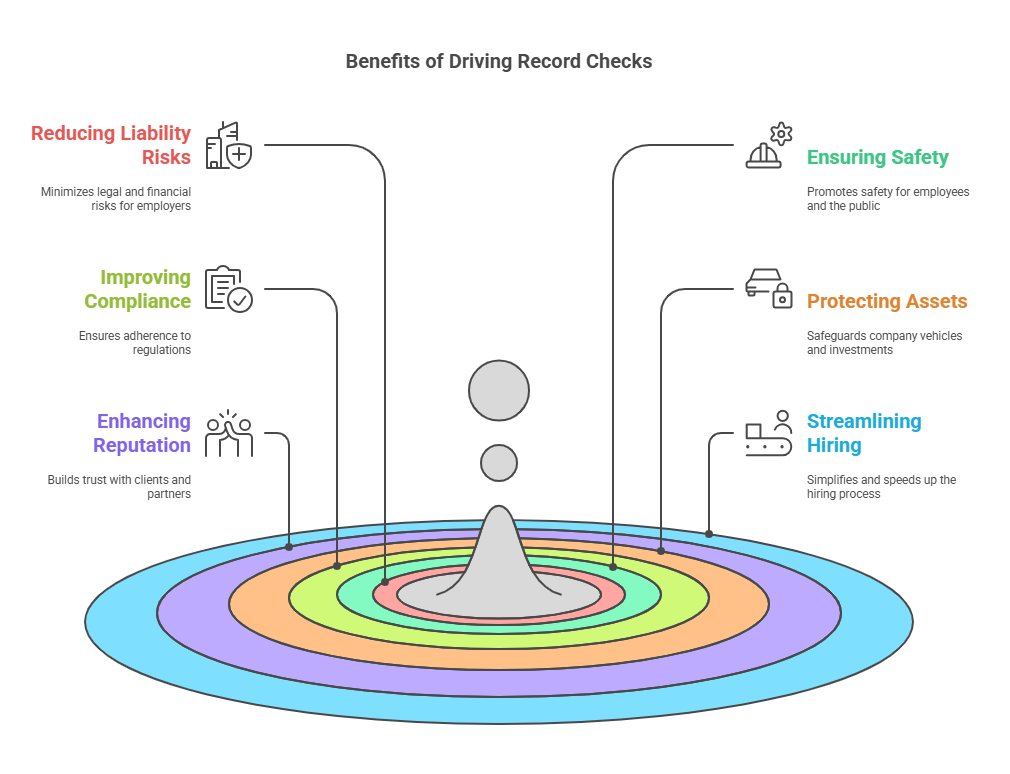
1. Reducing Liability Risks
Employers who conduct driving record checks can significantly reduce the risk of accidents or incidents caused by negligent driving. This proactive approach helps protect the company from potential lawsuits, costly insurance claims, and reputational damage.
- Example: A logistics company hiring a delivery driver with a history of DUIs may face legal liability if the driver causes an accident. A driving record check prevents such risks by identifying red flags early in the hiring process.
2. Ensuring Workplace and Public Safety
Hiring drivers with clean records helps maintain safety for employees, clients, and the general public. Safe drivers are less likely to be involved in accidents, fostering a secure environment both on and off the road.
- Key Benefits:
- Reduces vehicle-related injuries and fatalities.
- Builds trust among clients and stakeholders who value safety-conscious practices.
3. Improving Regulatory Compliance
Certain industries, such as transportation and logistics, are subject to strict regulations regarding driver qualifications. Conducting pre-employment driving record checks ensures compliance with:
- Federal Motor Carrier Safety Administration (FMCSA) regulations.
- Industry-specific safety standards for commercial drivers.
Failure to comply with these standards can result in hefty fines, legal action, or loss of operating licenses.
4. Protecting Company Assets
Company-owned vehicles represent a significant financial investment. Hiring responsible drivers with clean records minimizes the risk of damage to these assets.
- Additional Savings:
- Lower maintenance costs due to careful driving habits.
- Reduced vehicle downtime caused by accidents or repairs.
5. Enhancing Reputation and Customer Trust
A commitment to hiring safe and responsible drivers reflects positively on the company’s brand. Clients, customers, and partners are more likely to trust businesses that prioritize safety and professionalism in their hiring practices.
6. Streamlining the Hiring Process
By partnering with professional background check providers, employers can streamline the process of evaluating candidates. Automated systems and expert support ensure that driving record checks are completed efficiently and accurately.
What Employers Should Look for in a Driving Record
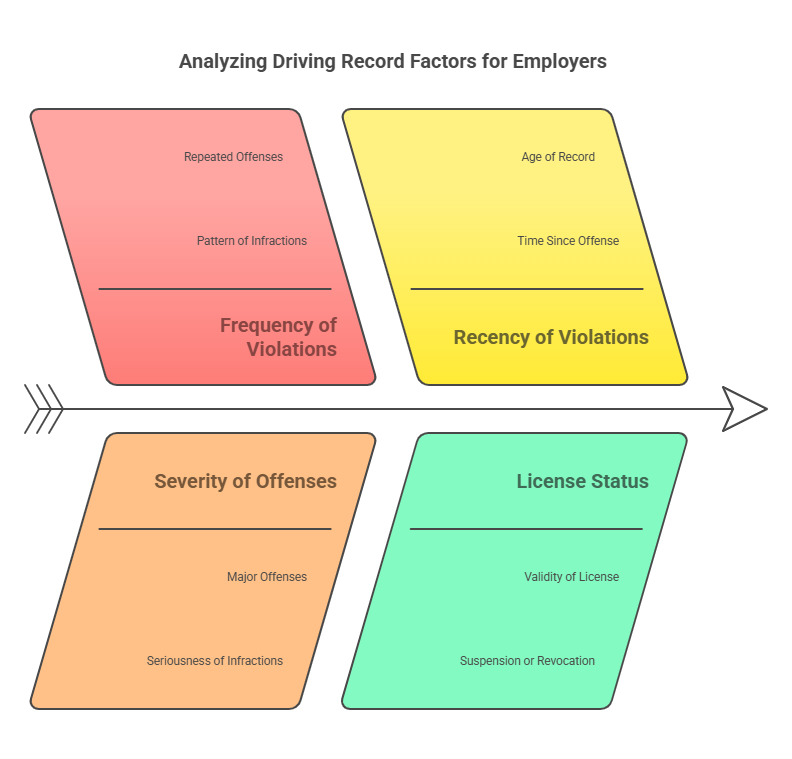
To maximize the effectiveness of a driving record check, employers should focus on the following key factors:
- Frequency of Violations: Does the candidate have a pattern of recurring infractions?
- Severity of Offenses: Are there any major offenses such as DUIs or reckless driving?
- Recency of Violations: How long ago did the offenses occur?
- License Status: Is the candidate’s license valid, suspended, or revoked?
- Consistency Across States: If the candidate has lived in multiple states, ensure that all relevant records are reviewed.
Legal Aspects of Pre-Employment Driving Record Checks
Conducting a Pre-Employment Driving Record Check involves several legal considerations that employers must follow to ensure compliance and avoid potential legal disputes. Below are the key legal frameworks and best practices for conducting these checks ethically and lawfully.
1. Fair Credit Reporting Act (FCRA) Compliance
The Fair Credit Reporting Act (FCRA) governs the use of consumer reports, including driving records, during the hiring process. Employers must comply with FCRA requirements to avoid penalties or lawsuits.
Key FCRA Requirements:
- Candidate Consent: Employers must obtain written consent before accessing a driving record. This ensures the process is transparent.
- Pre-Adverse Action Notice: If the driving record negatively affects the hiring decision, the employer must:
- Provide the candidate with a copy of the driving record.
- Include a summary of their rights under FCRA.
- Adverse Action Notice: After considering the candidate’s response, employers must issue a formal adverse action notice if the decision remains unchanged.
- Timely Record Handling: Employers should use recent and accurate driving records to make decisions, as outdated information may not reflect the candidate’s current qualifications.
2. Equal Employment Opportunity Compliance
Employers must avoid discriminatory practices when evaluating driving records. Decisions based on a driving record must be job-related and consistent with business necessity, as outlined by the Equal Employment Opportunity Commission (EEOC).
Avoiding Discrimination:
- Uniform Standards: Apply the same evaluation criteria for all candidates to prevent claims of bias.
- Relevance: Ensure the driving record is relevant to the job duties. For example, a minor speeding violation may not disqualify a candidate for an office role but could be significant for a delivery driver position.
3. State-Specific Laws
Driving record checks are subject to state-specific regulations, which may vary regarding:
- Disclosure and Consent: Some states require additional steps for notifying candidates.
- Accessing Records: Certain states restrict what information is included in a driving record (e.g., California limits the reporting of traffic violations older than three years).
- “Ban the Box” Laws: While primarily related to criminal history, some states have regulations that impact how employers can use driving records in hiring decisions.
Best Practices:
- Consult legal counsel or HR professionals to understand state-specific regulations.
- Partner with background check services familiar with state requirements.
4. Negligent Hiring Liability
Employers may face negligent hiring claims if they fail to conduct adequate background checks, including driving records, for roles requiring driving. Courts may hold employers accountable if an employee with a poor driving history causes harm while on duty.
5. Data Privacy Concerns
Driving records contain sensitive personal information. Employers must handle this data responsibly to comply with privacy laws and maintain trust with candidates.
Key Considerations:
- Secure Storage: Store driving records securely to prevent unauthorized access.
- Retention Policies: Retain records only for as long as necessary and dispose of them securely when no longer needed.
Frequently Asked Questions (FAQs)
Can an employer deny me a job because of a traffic violation on my driving record?
Yes, an employer can deny a job if the traffic violation directly impacts your ability to perform the job. For example, a delivery driver role may require a clean driving record to ensure safety and compliance.
How long do violations stay on a driving record?
The length of time violations remain on a driving record varies by state. In most states, minor violations stay for 3-5 years, while serious offenses like DUIs may remain for 10 years or more.
Can an employer check my driving record without my consent?
No, employers cannot legally access your driving record without your written consent. This requirement is mandated under the FCRA.
What can I do to clean up a driving record with multiple violations?
Improving a driving record may involve:
- Taking defensive driving courses to reduce points (if allowed in your state).
- Avoiding further violations by practicing safe driving habits.
- Checking for errors on your driving record and disputing inaccuracies with the DMV.
Do all employers require a pre-employment driving record check?
No, only employers hiring for roles involving driving typically require a driving record check. These include industries like transportation, delivery, and ride-sharing services.
Can an employer deny me a job because of a traffic violation on my driving record?
Yes, an employer can deny a job if the traffic violation directly impacts your ability to perform the job. For example, a delivery driver role may require a clean driving record to ensure safety and compliance.
How long do violations stay on a driving record?
The length of time violations remain on a driving record varies by state. In most states, minor violations stay for 3-5 years, while serious offenses like DUIs may remain for 10 years or more.
Can an employer check my driving record without my consent?
No, employers cannot legally access your driving record without your written consent. This requirement is mandated under the FCRA.
What can I do to clean up a driving record with multiple violations?
Improving a driving record may involve:
- Taking defensive driving courses to reduce points (if allowed in your state).
- Avoiding further violations by practicing safe driving habits.
- Checking for errors on your driving record and disputing inaccuracies with the DMV.
Do all employers require a pre-employment driving record check?
No, only employers hiring for roles involving driving typically require a driving record check. These include industries like transportation, delivery, and ride-sharing services.
Conclusion
A Pre-Employment Driving Record Check is a critical component of the hiring process for roles that involve driving responsibilities. Employers use these checks to ensure safety, reduce liability, and comply with regulatory requirements.
Key Takeaways for Employers:
- Always obtain written consent before conducting a driving record check to comply with legal standards like the FCRA.
- Use professional background check services, such as Exact Background Checks, to streamline the process and ensure accuracy.
- Evaluate driving records fairly, focusing on patterns of reckless behavior, license status, and the relevance of violations to the job.
- Stay informed about state-specific laws and privacy regulations to maintain compliance.
Key Takeaways for Candidates:
- Be aware that your driving record may impact your job prospects, particularly for roles requiring driving.
- Regularly review your driving record to ensure accuracy and address any issues.
- Understand your rights under the FCRA, including the right to dispute inaccuracies.
Employers and candidates alike benefit from a transparent and compliant process for driving record checks. By prioritizing accuracy, fairness, and safety, both parties can foster trust and make informed decisions that lead to successful employment relationships.



